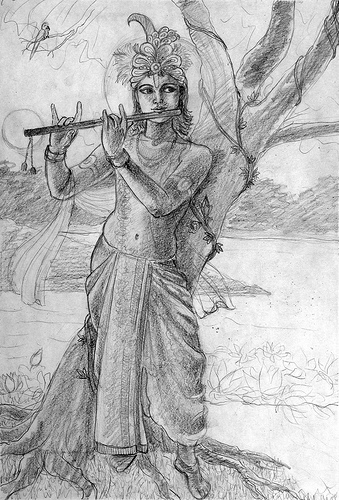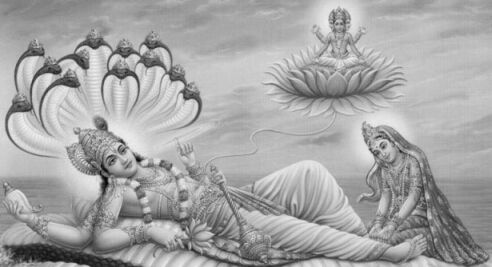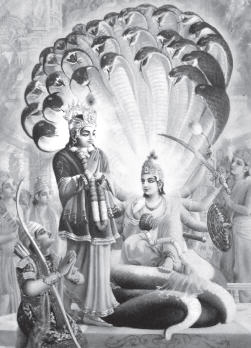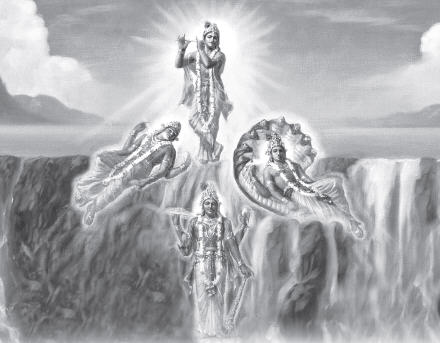Is Krishna an incarnation of Vishnu or the source of all incarnations?

In India, there is a common understanding that Lord Vishnu is the Supreme Personality of Godhead, and Krishna, Rama, etc., are His various incarnations. Even among the Vaisnava circles, who unanimously accept the supremacy of vishnu-tattva (Krishna, Vishnu and all incarnations) above all demigods including Lord Siva and Lord Brahma, there is difference of opinion regarding the position of Vishnu and Krishna. Srila Prabhupada gave various explanations clearing the position of Vishnu and Krishna, based on both logic and scripture.
SCRIPTURAL REFERENCES
The First Canto of the Srimad-Bhagavatam describes various incarnations of the Lord and Their activities. After describing the prominent incarnations, Suta Goswami quotes the following verse (Bhag. 1.3.28):
ete camsa-kalah pumsah
Krishnas tu bhagavan svayam
indrari-vyakulam lokam
mrdayanti yuge yuge
“All the incarnations are either plenary portions or portions of the plenary portions of the Lord but Lord Sri Krishna is the original Personality of Godhead. All of them appear on planets whenever there is a disturbance created by the atheists. The Lord incarnates to protect the theists.”
In his purport, Srila Prabhupada writes, “In this stanza the word svayam is particularly mentioned to confirm that Lord Krishna has no other source than Himself. Although in other places the incarnations are described as bhagavan because of their specific functions, nowhere are they declared to be the Supreme Personality. In this stanza the word svayam signifies the supremacy as the summum bonum.” Thus we understand that Lord Krishna is not just another avatara, or incarnation, but the avatari, one from whom all incarnations emanate.
The Brahma-samhita (5.46) compares Krishna to a candle from which several other candles are lit. These candles are compared to Lord Vishnu and the various incarnations.
diparcir eva hi dasantaram abhyupetya
dipayate vivrta-hetu-samana-dharma
yas tadrg eva hi ca vishnutaya vibhati
govindam adi-purusam tam aham bhajami
“The light of one candle being communicated to other candles, although it burns separately in them, is the same in its quality. I adore the primeval Lord Govinda who exhibits Himself equally in the same mobile manner in His various manifestations.” Although all candles have the same potency, the original candle still retains its uniqueness. Krishna is like that original candle, the source of all incarnations.
The Brahma-samhita also says: Vishnur mahan sa iha yasya kala-viseso govindam adi-purusam tam aham bhajami: “I adore the primeval Lord Govinda of whose subjective personality Maha-Vishnu is the portion of portion.” (Bs. 5.48)
Ramadi-murtisu kala-niyamena tisthan
nanavataram akarod bhuvanesu kintu
Krishnah svayam samabhavat paramah puman yo
govindam adi-purusam tam aham bhajami
“I worship Govinda, the primeval Lord, who manifested Himself personally as Krishna and the different avataras in the world in the forms of Rama, Narsimha, Vamana, etc., as His subjective portions.” (Bs. 5.39)
MAHA-VISHNU EAGER TO SEE KRISHNA

In the Srimad-Bhagavatam, tenth canto, we read the story of a brahmana who was living in the city of Dvaraka during Lord Krishna’s time. This brahmana was in great distress because every time his wife gave birth to a child, the child dropped dead immediately after touching the ground. He had nine children, and all of them died in a similar way. After the death of each child, the brahmana approached the king and accused him of being unable to protect the citizens. When he came to the king after the death of his ninth child, Arjuna happened to be present in Dvaraka. When he heard the accusations against the king, Arjuna assured the brahmana that he would take complete responsibility of protecting his next child.
When the tenth child was about to be born, Arjuna, with his holy mantras and celestial arrows, made all arrangements to protect the child. But as soon as the child was born, both the child and Arjuna’s arrows mysteriously disappeared into the sky. The brahmana condemned Arjuna and accused him of making false promises even though other great personalities in Dvaraka had failed to protect his children. Arjuna then went all over the universe to higher, middle, and lower planetary syste searching for the dead child, but all his attempts proved futile. When he finally decided to throw himself in fire in disgrace, Lord Krishna assured him saying He would personally help Arjuna get the child.
After mounting on His transcendental chariot, Krishna and Arjuna proceeded north crossing over many planetary systems. They reached the covering of the universe which is described as great darkness. Using His Sudarsana cakra, Krishna illuminated the sky, and thus they were able to cross over this dark region. On reaching the effulgent region of brahmajyoti, Krishna informed Arjuna that this transcendental light was non-different from Him. Then they both entered the Karana Ocean, the vast spiritual water that is the origin of material creation. Within the water, Arjuna saw a huge palace with thousands of pillars and columns made of valuable jewels. Inside the palace Arjuna saw the gigantic beautiful form of Anantadeva, on whose soft body Maha-Vishnu was laying comfortably. On seeing Krishna and Arjuna, Maha-Vishnu said, “My dear Krishna and Arjuna, I was very eager to see you both, and therefore I arranged to take away the babies of the brahmana and keep them here. I have been expecting to see you both at this palace.”
Srila Prabhupada explains to us that Sukadeva Goswami narrated this story in order to prove that among all vishnu-tattva forms, Lord Krishna is one hundred percent the Supreme Personality of Godhead.
THE THREE VISHNUS
The Satvata-tantra explains the various purusa incarnations (expansions) that appear in different Vishnu forms.
visnos tu trini rupani
purusakhyany atho viduh
ekam tu mahatah srastr
dvitiyam tv anda-samsthitam
trtiyam sarva-bhuta-stham
tani jïatva vimucyate

For material creation, Lord Krishna’s plenary expansion assumes three Visnus. The first one, Maha-Vishnu, creates the total material energy, known as the mahat-tattva. The second, Garbhodakasayi Vishnu, enters into all the universes to create diversities in each of them. The third, Ksirodakasayi Vishnu, is diffused as the all-pervading Supersoul in all the universes and is known as Paramatma. He is present even within the atoms. All the incarnations within the universe are emanations from this Ksirodakasayi Vishnu.
So when Krishna descends into this universe, He follows the regular course coming through Ksirodakasayi Vishnu. Therefore people mistakenly think that Krishna is one among Vishnu’s incarnations, whereas actually He is the original Supreme Personality of Godhead, the fountainhead of everything and the source of all incarnations.
In one lecture Srila Prabhupada explained, “Krishna has a direct expansion, and then expansions of the expansion. His immediate expansion is Lord Baladeva, or Balarama. Then from Balarama come the catur-vyuha, the quadruple expansions of Vasudeva, Saìkarsana, Pradyumna, and Aniruddha. And from Saìkarsana, the Narayanas expand. Then from the Narayanas come second sets of Vasudeva, Saìkarsana, Pradyumna, and Aniruddha.” (BTG May 1984) Thus we see that there are unlimited expansions of Krishna.
THE HOLY NAMES OF KRISHNA AND VISNHU
The revealed scriptures also give us specific information regarding the power of the holy names of Krishna, Vishnu and Rama. A conversation between Lord Siva and his wife Durga appears in the Brhad-vishnu-sahasranama-stotra in the Uttara-khanda of the Padma Purana (72.335):
rama rameti rameti
rame rame manorame
sahasra-namabhis tulyam
rama-nama varanane
“O Varanana [Durga], I chant the holy name of Rama, Rama, Rama and thus enjoy this beautiful sound. This holy name of Ramacandra is equal to one thousand holy names of Lord Vishnu.”
Chanting the holy name of Krishna once is equivalent to chanting three thousand names of Lord Vishnu.
sahasra-namnam punyanam
trir-avrttya tu yat phalam
ekavrttya tu Krishnasya
namaikam tat prayacchati
“The pious results derived Krishna.” [This verse from the Brahmanda Purana appears in Srila Rupa Goswami’s Laghu-bhagavatamrta (1.5.354).]
KRISHNA’S SPECIAL QUALITIES
In the Bhakti-rasamrta-sindhu, Srila Rupa Goswami lists out sixty-four qualities of Lord Krishna. Out of these sixty-four qualities, fifty qualities can be found among the individual living entities in minute quantities, fifty-five qualities are sometimes manifested partially in Lord Brahma or Lord Siva, and sixty qualities are manifest in the body of Narayana (Vishnu). The remaining four qualities, however, are found only in Krishna and no one else, not even Vishnu. Srila Prabhupada explains them in The Nectar of Devotion:
1. Lila-madhurya He is the performer of wonderful varieties of pastimes (especially His childhood pastimes).
2. Bhakta-madhurya He is surrounded by devotees endowed with wonderful love of Godhead.
3. Venu-madhurya He can attract all living entities all over the universes by playing on His flute.
4. Rupa-madhurya He has a wonderful excellence of beauty which cannot be rivaled anywhere in the creation.
GOD AT OFFICE AND GOD AT HOME

Krishna in Vrndavana is like God at home, while Krishna, as Vishnu in various Vaikuntha planets, is like God at office. A person at home is most comfortable and relaxed and has intimate loving dealings with his family members joking, playing, etc., with his wife or children. At office, however, he has very formal dealings with his associates; there is no frivolity involved in the interactions with his colleagues. Similarly in Vrndavana, all the Vrajavasis have very intimate dealings with Krishna in sakhya (friendship), vatsalya (parental) and madhurya (conjugal) rasas. His cowherd boyfriends wrestle with Him while playing various games, mother Yasoda sometimes chastises Him for doing childish mischief, while His cowherd girlfriends many times admonish Him in various loving ways. No one in Vrndavana is aware of Krishna’s supreme position as God; that awareness usually results in very formal and reverential dealings. In the Vaikuntha planets, however, everyone is aware of Vishnu’s supreme position as the controller and maintainer of the whole creation. Therefore, all their dealings with Him, including madhurya, are tinged with the feelings of awe and reverence.
THE SUPEREXCELLENT BEAUTY OF KRISHNA
In His teachings to Sanatana Goswami, Lord Caitanya described the inconceivable beauty of Lord Krishna. Srila Prabhupada summarizes them in his book Teachings of Lord Caitanya: “Krishna is known as Madana-mohana because He conquers the mind of Cupid. When He stands in a three-curved way, He attracts all living entities, including the demigods. Indeed, He even attracts the Narayana form which presides in each and every Vaikuntha planet. Since He is the origin of all incarnations, including the form of Narayana, the goddess of fortune, who is a constant companion of Narayana, gives up Narayana’s association and engages herself in penance in order to gain the association of Krishna. Such is the greatness of the superexcellent beauty of Krishna, the everlasting mine of all beauty. It is from that beauty that all beautiful things emanate.”
So, from an impartial study of Vishnu and Krishna we can see that Krishna’s pastimes are more sweet and enchanting than those of Vishnu. In that sense, Krishna is superior to Vishnu. Otherwise there is no difference between the two.
Mukunda Mala Dasa has a bachelor’s degree in ET&C Engineering. He is part of BTG editorial team.
Thank you very much.
